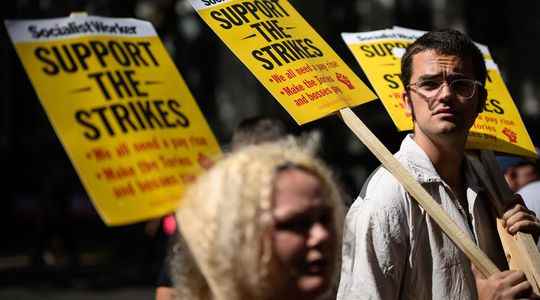After a difficult summer, winter will not be a moment of respite. Inflation, rising energy prices, war in Ukraine… It’s time to respond to these multiple challenges for the Old Continent. On Friday 9 September, European energy ministers said they were in favor of a series of emergency measures to curb soaring gas and electricity bills, even mentioning a cap on the price of gas imports from the Union European.
But will that be enough? While annual inflation in the 19 countries of the euro zone rose again in August, settling at 9.1%, the anger of Europeans is beginning to mount. In Paris, a demonstration took place on Saturday, September 3, against the consequences of the economic and energy crisis, at the call of Florian Philippot and his movement Les Patriotes. If this gathering remained quite marginal, the CGT and Solidaires blocked the date of September 29 to organize a day of strike and demonstration. In addition to inflation and the energy crisis, concerns about pensions and unemployment insurance will be on the menu for this social return.
Among our Belgian neighbours, the unions are also getting ready to fight the rise in energy prices. The various movements have filed a general strike notice for the month of November. “If we give notice it’s not for fun but it’s because before the holidays we organized a national demonstration which brought together 80,000 people, it’s because since then the bills explode, and that there is no answer”, hammered, in the Belgian daily The evening, Thierry Bodson, the president of the General Federation of Labor of Belgium, the second Belgian trade union federation.
“If there is no response by the end of September, the strike will take place. With each passing month, anxiety and anger rise among people,” he added. . At this stage, the federal and regional governments have adopted a few measures, which the Belgians consider insufficient.
The extremes pound the pavement across the Rhine
For its part, the German federal government is also trying to heal the country’s economic wounds with the promise of aid of 65 billion euros to support households in the face of galloping inflation. It is still necessary that the people concerned feel the effects, at the risk of allowing a social uproar to emerge this winter. “Savings, always savings, more savings”, the Germans are tired of hearing that they have to tighten their belts, assured, on August 29, the german magazine Focus.
Far left and far right parties have called for demonstrations every Monday in Berlin and Leipzig. Among the general watchwords: purchasing power. By beating the pavement, the two camps, which have taken care not to mix, wish to register the beginning of a “hot autumn”, an expression used by the far-right party Alternative for Germany (AfD). During the first demonstration, on September 5, around 4,000 people responded to the call of Die Linke, a radical left party, “nearly double the number of far-right demonstrators”, specifies Der SpiegelGerman weekly, taken over by International mail.
From there to seeing the emergence of a large-scale social protest movement? the Der Spiegel doesn’t seem convinced. “In recent weeks, we have heard a lot of warnings about major demonstrations to come, we were talking about a ‘winter of discontent'”, but “the ‘warm autumn’ has turned out to be rather lukewarm”, notes the media. .
Across the Channel, the dispute machine remains well and truly engaged. If the summer was marked by the biggest strike movement in decades, the winter will, it seems, be no less hectic. In question: inflation at more than 10%, a risk of recession and a fall in its currency. In order to put out the fire, the new British Prime Minister Liz Truss has promised to announce measures next Thursday to stem the scale of the cost of living crisis. But she has already ruled out, during her first duel with the leader of the opposition, taxing energy companies to finance them.
Italians are burning their bills
British protesters are organizing around the “Don’t Pay UK” movement, which has brought together more than 180,000 signatories since its launch last June. This is a petition launched among citizens to stop paying their bills from October 1, the date on which regulated gas and electricity prices must inflate by 80%. ‘Don’t Pay UK’ said it would only act if a million people signed off on mass non-payment of energy bills by October 1. Similar movements sprung up in Glasgow (Scotland), where furious marchers burned their bills.
Same gesture of despair in Naples, a popular city in southern Italy. Friday, September 2, unemployed citizens gathered in Piazza Matteotti to protest and reduce their bills to ashes. Displaying a feeling of powerlessness towards the Italian political class, those present shouted “nothing will change after the elections”, the ballot being scheduled for September 25th. And the unemployed of the November 7 Movement do not intend to stop there: other dates of protest are relayed on their Facebook pagefollowed by 5,000 people.
“It will be a very hot autumn, the situation of families is very difficult, the cost of bills is unsustainable and it concerns those who have work and those who do not,” said the mayor of Naples, Gaetano Manfredi, September 2nd. In Italy, many are worried about inflation, the effects of which on foods such as bread and pasta are crippling the economy of the most vulnerable households. Among food products, milk in particular exceeded 2 euros, according to The echoestaking over the Italian daily La Stampa. All the ingredients are there for a winter of protest on the Old Continent.
